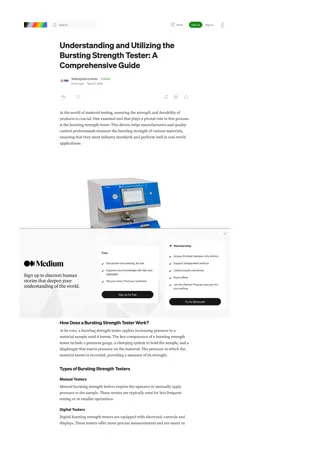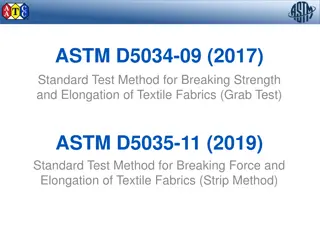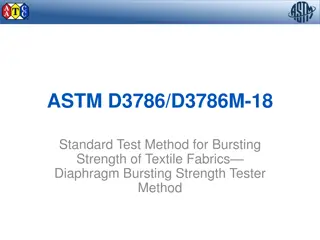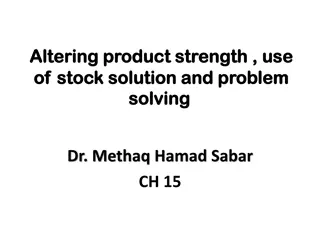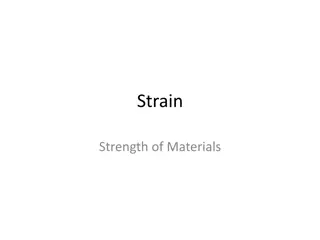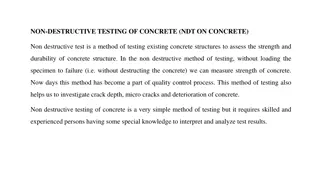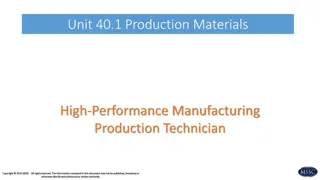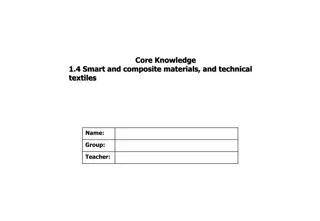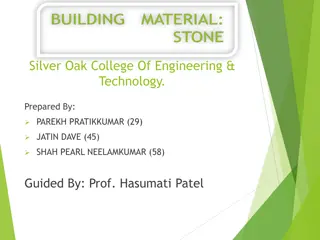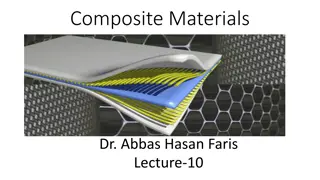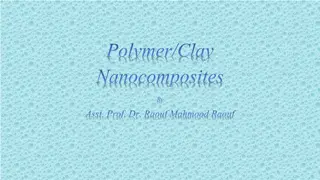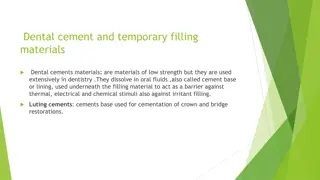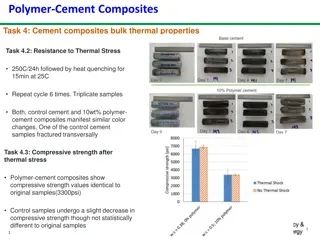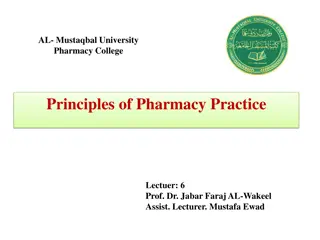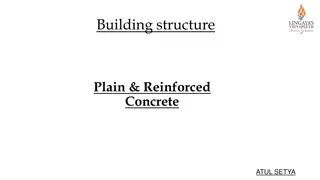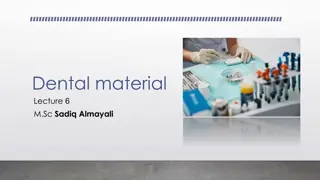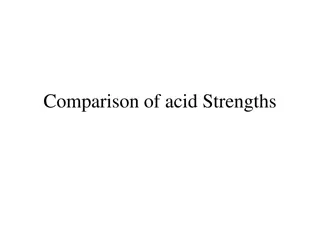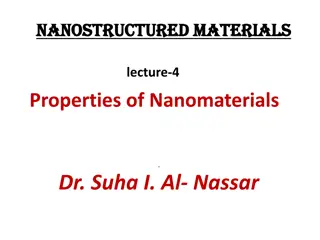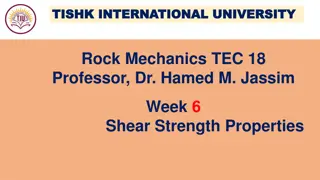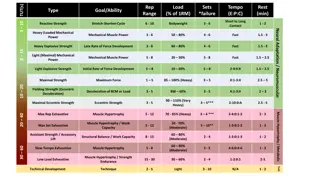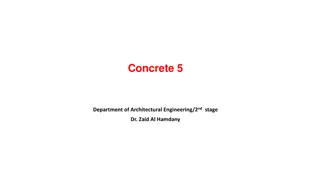Enhance Your Fitness Journey: Core Strength and Speed Workouts
Explore the importance of core strength in maintaining posture and physical performance, engage in a virtual group challenge to test your endurance with wall planks, and boost your core strength with a practical 7-minute workout. Transition into focusing on speed with insights into sprinting, cyclin
0 views • 38 slides
Understanding Pharmaceutical Calculations: Altering Product Strength and Solutions
Pharmaceutical calculations involve altering the strength of pharmaceutical preparations by adjusting the proportion of active ingredients, using stock solutions, and problem-solving techniques. This process includes dilution, fortification, and concentration changes to achieve desired product stren
7 views • 23 slides
Understanding and Utilizing the Bursting Strength Tester: A Comprehensive Guide
In the world of material testing, ensuring the strength and durability of products is crucial. One essential tool that plays a pivotal role in this process is the bursting strength tester. This device helps manufacturers and quality control professionals measure the bursting strength of various mate
6 views • 5 slides
Testing Methods for Textile Fabrics Breaking Strength and Elongation
Standard testing methods, ASTM D5034 and D5035, are used to determine the breaking strength and elongation of textile fabrics through grab and strip tests. The grab test measures the effective strength of fabric using adjacent yarns, while the strip test compares the strength of unwoven yarns. Appar
0 views • 29 slides
Pharmacy Practice: Percentage and Ratio Strength Calculations
Understanding percentage and ratio strength calculations is crucial in pharmacy practice. Percentages can be expressed as fractions or decimals, and various concentrations like weight-in-volume and volume-in-volume are used in pharmaceutical preparations. Learn how to calculate the correct strength
0 views • 24 slides
Understanding Strength-Duration (SD) Curve: A Neuromuscular Diagnostic Test
Strength-Duration (SD) curve is a diagnostic test assessing neuromuscular integrity by measuring the relationship between stimulus strength and duration. It helps in electro-diagnosis of peripheral nervous system disorders and evaluates nerve degeneration and regeneration. The curve is obtained by p
2 views • 17 slides
ASTM D3786/D3786M-18 Standard Test Method for Bursting Strength of Textile Fabrics
This standard test method, ASTM D3786/D3786M-18, specifies the procedure for determining the bursting strength of textile fabrics using a diaphragm bursting strength tester. The test involves clamping the specimen over an expandable diaphragm and applying pressure until the fabric ruptures. The burs
0 views • 16 slides
Understanding Physical Properties of Materials in Grade 7 Natural Sciences
Exploring the physical properties of materials like strength and flexibility helps us decide which materials to use for specific purposes. Strong materials like steel and concrete are used in construction, while flexible materials like rubber and copper wire have different applications. Consideratio
1 views • 17 slides
Understanding Pharmaceutical Product Strength Alteration
Exploring methods to adjust the strength of pharmaceutical preparations by manipulating the proportion of active ingredients, dilution, concentration, and the relationship between strength and total quantity. Learn about solving problems related to altering product strength using inverse proportion,
0 views • 17 slides
Understanding Stress-Strain Behavior in Materials
The stress-strain diagram illustrates how materials respond to mechanical forces, showcasing various properties such as elastic limit, yield point, ultimate strength, and rupture strength. By analyzing the curve, engineers can determine the material's behavior under different loads and stresses, aid
0 views • 6 slides
Understanding Pharmaceutical Preparations: Strength and Concentration
Pharmaceutical preparations can have their strength and concentration adjusted by changing the proportion of active ingredients. This process involves increasing or decreasing the active ingredient, adding diluents, admixing with other preparations, or evaporating the vehicle. Dilution of liquid, so
0 views • 34 slides
Spiritual Warfare and Divine Strength in the Book of Daniel
Delve into the spiritual battles depicted in the book of Daniel, where unseen forces clash, and divine strength empowers the faithful to stand strong. Explore the glorious visions, the reality of spiritual warfare, and the strength available for the overwhelmed in a world where we wrestle not with f
0 views • 6 slides
Importance of Non-Destructive Testing in Concrete Structures
Non-destructive testing (NDT) of concrete plays a crucial role in assessing the strength, durability, and quality control of structures. This method involves assessing properties such as density, strength, crack depth, and reinforcement location without damaging the concrete. NDT is essential for ve
0 views • 5 slides
Engineering Materials and Production Techniques Overview
Learn about the various types of engineering materials used in high-performance manufacturing, including natural and synthetic materials. Explore the properties of materials, such as strength, conductivity, and resistance. Discover the different categories of metals, alloys, and polymers commonly ut
0 views • 19 slides
Best Strength Gym in Elanora
Are you looking for the Best Strength Gym in Elanora? Then contact Nexus Performance Gym. Your space to find strength, join a community, and get educated!! Located on the southern end of the Gold Coast. Whether you're an elite athlete or new to stren
0 views • 6 slides
The Power of Courage in Faith: Strength Through God's Presence
Drawing strength from faith in God, courage empowers us to face challenges with perseverance and bravery. With a reminder from Joshua 1:9, we are encouraged to be strong and courageous, knowing that God is always with us. This definition of courage, both from Webster's and the Bible, highlights the
3 views • 4 slides
Understanding Materials Science and Engineering Fundamentals
Materials play a crucial role in our daily lives, influencing everything from transportation to communication. This lecture delves into the historical significance of materials, the distinctions between materials science and materials engineering, and the importance of structure-property correlation
1 views • 25 slides
Exploring Smart and Composite Materials in Modern Technology
The content delves into the realm of smart and composite materials, highlighting modern advancements and applications such as shape-memory alloys, nanomaterials, photochromic glass, temperature-responsive polymers, and more. It discusses the advantages, disadvantages, and examples of composites like
0 views • 11 slides
Contribution of Quadriceps, Hamstrings, and Latissimus Dorsi Muscle Strength to Rowing Performance in West Java
Rowing is a demanding sport that requires strong leg muscle strength for optimal performance, particularly in West Java where rowing athletes train. This study aims to investigate the contribution of quadriceps, hamstrings, and latissimus dorsi muscle strength to the performance of rowing athletes i
0 views • 16 slides
Understanding Stones and Bricks in Construction Engineering
Stones and bricks are essential materials in construction engineering, providing strength and durability to structures. Stones are classified based on geological, physical, and chemical properties, while bricks come in traditional and modular types with specific compositions. The properties of a goo
0 views • 21 slides
Personalized Fitness Plan: Achieve Your Goals with Structured Workouts and Fun Activities
Design your own fitness plan incorporating 60 minutes of daily physical activity and exercises to improve strength, endurance, and flexibility. Create a balanced schedule with structured workouts including strength training, endurance exercises, and flexibility routines. Fill your plan with everyday
0 views • 10 slides
Understanding Filament Winding Process for Composite Materials
Filament winding is an automated open molding process used for manufacturing hollow products like tubular structures, pressure vessels, and pipes. This process involves winding resin-impregnated fibers over a rotating mandrel to create high-strength composite parts. Common raw materials include cont
0 views • 15 slides
Advances in Polymer/Clay Nanocomposites
Clay, particularly montmorillonite, is being increasingly utilized as a reinforcing agent in polymer nanocomposites. By modifying the clay's surface with organic onium ions, the compatibility between clay and polymer is enhanced, leading to improved mechanical and thermal properties in the resulting
0 views • 11 slides
Understanding Dental Cements and Temporary Filling Materials
Dental cements are essential in dentistry, acting as barriers against various stimuli and irritants. They can be classified based on different compounds and have specific applications such as root canal sealers and orthodontic bonding. Zinc phosphate cement is a common material used for lining, whil
0 views • 24 slides
Total Body Push Pull Rotate Training for Strength and Endurance
Total Body Push Pull Rotate Training helps improve muscular endurance and strength by alternating exercises from different strength training categories. The workout consists of choosing exercises from push/pull categories and incorporating rotational movements for a comprehensive full-body workout.
0 views • 5 slides
Study on the Thermal and Chemical Properties of Polymer-Cement Composites
The study investigates the resistance of polymer-cement composites to thermal stress and chemical attacks such as acidic and high CO2 environments. Results show similar color changes in control cement and polymer-cement composites after thermal stress, with the latter maintaining compressive strengt
0 views • 5 slides
When I Am Weak, Then I Am Strong: Understanding Strength in Weakness
In 2 Corinthians 12:6-10, the apostle Paul reflects on how a thorn in the flesh humbled him, leading to a greater understanding of God's grace and strength in weakness. This passage emphasizes that true strength is found in acknowledging our dependence on Christ, allowing His power to be perfected i
0 views • 7 slides
Understanding Ratio Strength and Milligrams Percent in Pharmacy Practice
In the field of pharmacy practice, understanding ratio strength and milligrams percent is essential for preparing solutions accurately. Ratio strength involves expressing concentrations in parts per hundred, while milligrams percent denotes the amount of substance in 100 mL of liquid. This article e
0 views • 10 slides
Understanding Plain & Reinforced Concrete Structures in Design Engineering
In the design of Plain & Reinforced Concrete structures, various strength design methods such as Ultimate Strength Design (USD) and Allowable Strength Design (ASD) are utilized. These methods involve factors of safety, material strength, load factors, and analysis in the elastic range. Additionally,
0 views • 11 slides
Understanding Rheology in Dental Materials
Rheology is a crucial aspect in dentistry as it deals with the flow properties of various dental materials, including liquids like molten alloy and impression materials. Viscosity plays a key role, determining how materials flow and behave. Different fluid classifications based on rheology, such as
0 views • 15 slides
Factors Affecting Acid Strength: Atoms, Size, Hybridization, and Electronegativity
The strength of acids is influenced by various factors such as the atom on which the negative charge of the acid's conjugate base rests, atom size, hybridization, and electronegativity. The stability of negative charges on atoms, atom size allowing charge delocalization, preferred orbital types for
0 views • 23 slides
GripTrack: Innovative Device for Monitoring Elderly Health
GripTrack is a portable grip strength monitoring device designed to track cardiovascular and musculoskeletal health in the elderly population. It aims to provide an accurate early warning system by assessing grip strength, which can indicate cognitive decline, cardiovascular health, and frailty synd
0 views • 14 slides
Understanding Specification Strength and Substitutability
Specifications in software development play a crucial role in determining the strength of requirements and the ability to substitute implementations. This content discusses how stronger specifications imply weaker ones, the importance of satisfaction in specifications, and the application of the Lis
0 views • 42 slides
Understanding Mechanical Properties of Nanostructured Materials
Nanostructured materials exhibit unique mechanical properties due to factors like grain boundary structure and dislocation movement. Reduction in grain size can enhance strength and hardness while reducing ductility. Nanomaterials may reach theoretical strength levels, significantly higher than sing
0 views • 23 slides
Types of Conductors in Transmission Lines
Aluminum conductors, such as AAC, AAAC, ACSR, and ACAR, are commonly used in transmission lines due to their high conductivity, tensile strength, light weight, and resistance to corrosion. AAC is known for its good conductivity but limited strength, while AAAC offers better mechanical strength and c
0 views • 17 slides
Understanding Shear Strength in Engineering Materials
Shear strength is a crucial mechanical property that defines a material's ability to resist forces causing internal structure to slide. This property plays a significant role in various engineering fields, impacting design, construction, and material selection. Shear strength is essential in prevent
0 views • 31 slides
Enhancing Concrete Strength and Durability with Silica Fume and Fly Ash
The research explores the use of industrial waste materials like fly ash and silica fume in concrete to improve its strength and durability. By replacing a portion of cement with these materials, the resulting concrete mix becomes stronger, more durable, and eco-friendly. Fly ash and silica fume con
0 views • 12 slides
Understanding Rock Mechanics and Strength Assessment in Tishk International University
Tishk International University delves into the challenges of assessing jointed rock masses and determining their strength. The Hoek-Brown failure criterion, developed through empirical data fitting, plays a crucial role. Back-analysis of failures offers insights, while predicting strength for large-
0 views • 21 slides
Strength Training Guidelines and Performance Metrics
Explore a comprehensive guide to strength training, covering rep ranges, load percentages, tempo, rest intervals, and various strength development goals. Additionally, discover insights into bar velocities, pound-for-pound equations, peak power formulas, and strategies for maximizing repetitions.
0 views • 18 slides
Understanding Concrete Strength in Structural Design
Concrete strength, including compressive, tensile, and flexural strengths, plays a crucial role in structural design. Compressive strength is the main quality criterion, while tensile strength is lower due to concrete's brittleness. Flexural strength also impacts the behavior of structural members.
0 views • 17 slides


